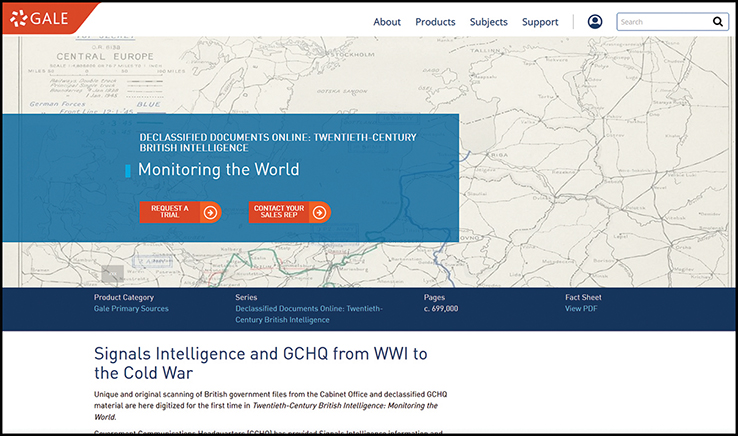Declassified Documents Online: Twentieth-Century British Intelligence—Monitoring the World | eReviews
Monitoring the World collections are essential primary documents for researchers of 20th-century British intelligence and excellent resources for anyone with an interest in World War I, World War II, or early Cold War strategy.
Declassified Documents Online: Twentieth-Century British Intelligence—Monitoring the World
CONTENT Gale’s Declassified Documents: Twentieth Century British Intelligence is a multi-collection database of declassified UK documents on British intelligence activities in the 20th century. The first collection, “An Intelligence Empire,” contains 500,000 pages covering the years 1905–2002 from five departments: Security Service, Ministry of Defence, Special Operations Executive, Colonial Office’s Intelligence, and Cabinet Office. The new “Monitoring the World” module adds 17 series of manuscripts from Government Communications Headquarters, the central agency for intercepting, decrypting, translating, and analyzing signals intelligence, as well as 10 series of documents from the Central Intelligence Agency, Joint Intelligence Committee/Sub-Committees, and the Overseas Joint Intelligence Group in the Cabinet Office. The collection includes decrypts of intercepted telegrams, correspondence, summary reports, daily records, analyses, and assessments with special emphasis on World War II intelligence. All told, approximate 700,000 documents for the period 1914–45 are available in the archive.
USABILITY The look, layout, search options, and functionality are consistent with the Intelligence Empire module. The landing page consists of a large search box with links for information about the resource, browsing by department, research tools, search history information, and options for using the topic-finder and term-frequency textual analysis tools.
Users have a variety of convenient and effective ways to search for and retrieve documents. Besides using the homepage search box for simple keyword and subject terms, or advance search with its five different fields and nine search limiters for more complex searches, clicking on “Browse Department” will retrieve Cabinet Office and Government Communications Headquarters icons. Selecting either icon will enable users to view individual manuscripts from that series with filters for document type and language. On the whole, the searching process is intuitive and seamless.
Selecting “Research Tools” will open a page listing seven resources, including an immensely helpful Abbreviations guide and several interesting documents such as a National Intelligence Machinery Booklet (2010).
Documents can be easily read with several viewing enhancements, including an option for plain text mode that incorporates OCR. Documents can be downloaded and printed. In addition, they can be emailed and sent to either Google Drive or One Drive. Citations in a variety of styles can be exported to citation management tools. Searches can be saved after creating an account.
The database is searchable as a stand-alone resource, with cross searching capabilities for libraries that subscribe to other Gale Primary Sources.
PRICING Perpetual access purchase options are available starting at $7,029, with a hosting fee that starts at $64 annually for academic libraries and is based on the size of the institution, as well as Carnegie type and budget level. Subscriptions and trial options are available.
VERDICT Monitoring the World collections are essential primary documents for researchers of 20th-century British intelligence and excellent resources for anyone with an interest in World War I, World War II, or early Cold War strategy. In addition to its stellar content, the database has discoverability options and user features that are sensible and helpful. By and large, the module is an outstanding complement to the “Intelligence Empire” series and enhances the excellent Declassified Documents Online database.
RELATED
ALREADY A SUBSCRIBER? LOG IN
We are currently offering this content for free. Sign up now to activate your personal profile, where you can save articles for future viewing










Add Comment :-
Comment Policy:
Comment should not be empty !!!